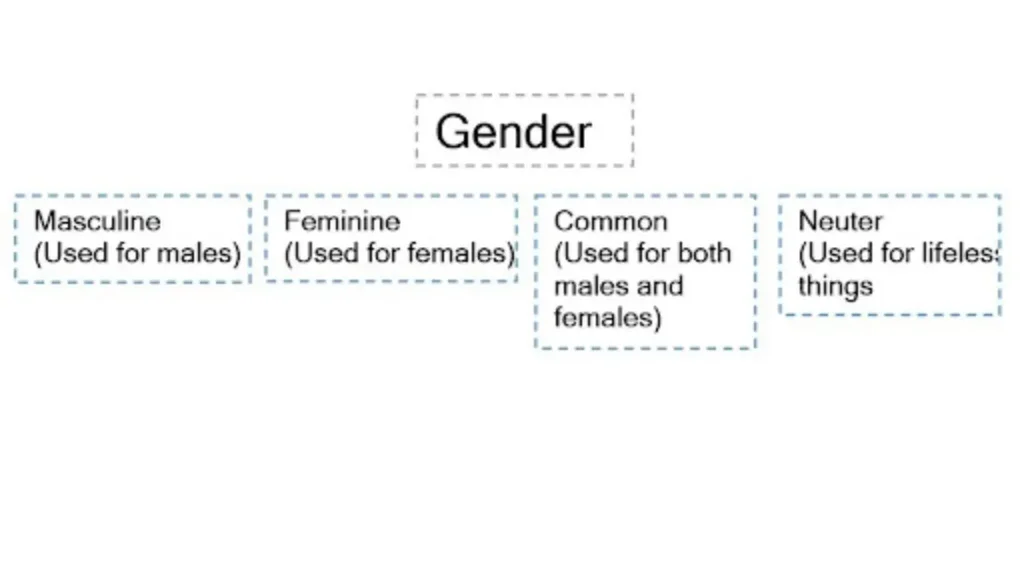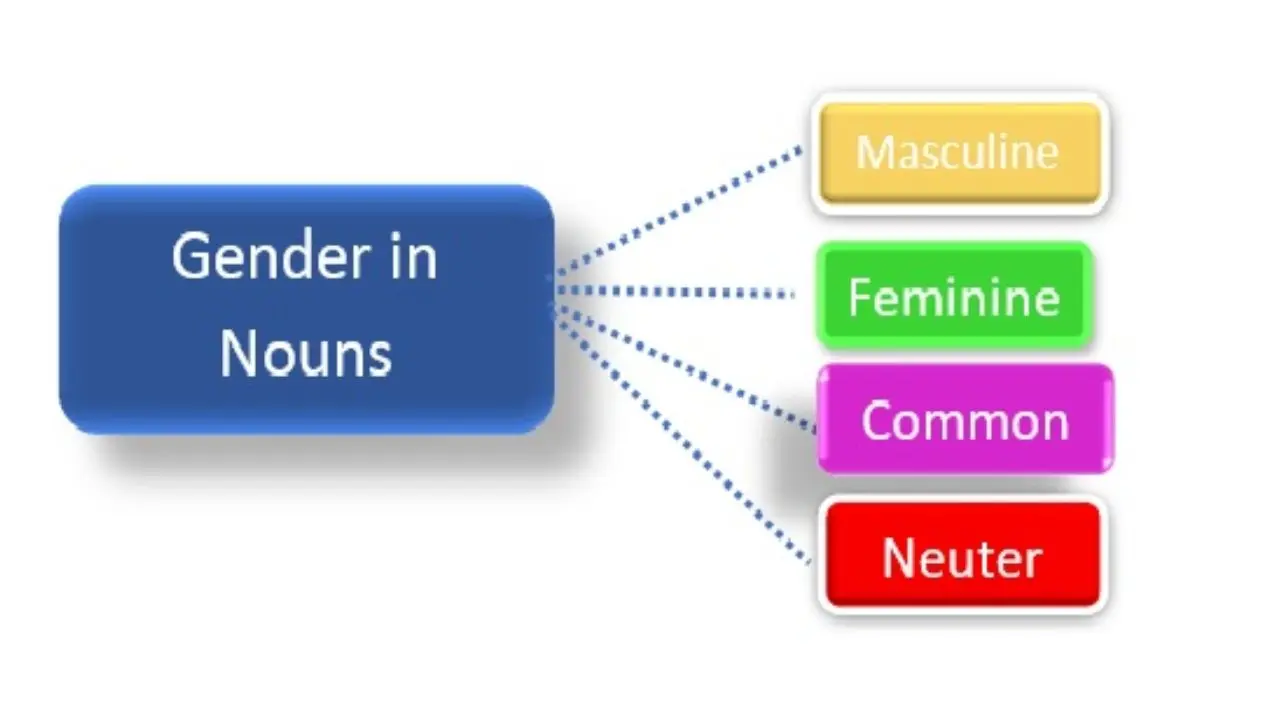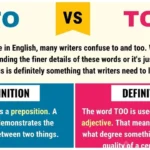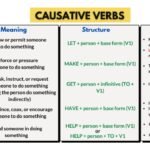Type Of Noun Based On Gender : Noun is a very important topic or chapter of English Grammar. If you want to know English speaking or English well then you should have good knowledge about Noun. In this post, we have tried to explain all the Nouns in great detail.
If you do not know what is a letter?, what is a word? or what is a paragraph? Then you can get basic information of English Grammar by clicking here.
What is Noun?
A noun is a name of anything. That is, any name will be called a Noun, but let us tell you that that name should also have some meaning. If that name does not have any meaning then we will not call it a Noun.
Example: – Ram, Boy, Water, Honesty, Cat etc.
Noun: On the basis it’s Gender Noun is divided into four forms:
On the basis of gender, noun is divided into four parts.
- Masculine Gender
- Feminine Gender
- Common Gender
- Neuter Gender
Masculine Gender
Masculine – Muscle – Power – Male
Definition: A noun that indicates male community is called masculine gender. For example, brother, father, uncle, maternal grandfather etc. indicate male community. Hence, we can say that all these nouns are masculine gender.
Definition: A Noun that belongs to a male community is kept is Masculine gender.
Example: Father, Brother, Ram, Uncle etc.
- Brother – Refers to a male sibling.
- Father – Refers to a male parent.
- King – Refers to a male monarch.
- Uncle – Refers to a male relative, specifically the brother of one’s parent.
- Gentleman – Refers to a man of high social status or good manners.
Feminine Gender
Feminine – Free miner – Beauty – Female
Definition: A noun that indicates female community is called feminine gender. For example, mother, sister, aunt, grandmother, maternal grandmother etc. all nouns indicate feminine gender. Hence all these nouns are of feminine gender.
Definition: A Noun that belongs to a female community is kept is Feminine gender.
Example: Mother, Sisters, Auntie etc.
- Sister – Refers to a female sibling.
- Mother – Refers to a female parent.
- Queen – Refers to a female monarch.
- Aunt – Refers to a female relative, specifically the sister of one’s parent.
- Lady – Refers to a woman of high social status or good manners
Common Gender
Definition: A noun which is either masculine or feminine but cannot be recognized by name kept common gender is called common gender. For example: Doctor, Engineer, Student, Teacher etc.
Definition: A Noun that is either masculine or feminine but can not be recognized by name kept common gender.
Example: Doctor, Engineer, Student, Teacher etc.
- Teacher – Can refer to both male and female educators.
- Parent – Can refer to both a mother and a father.
- Doctor – Can refer to both male and female medical professionals.
- Friend – Can refer to both male and female individuals in a friendship.
- Student – Can refer to both male and female learners.
Neuter Gender
Definition: A noun which is mentally or sexually developed or is not developed in both the qualities is kept in neuter gender.
Definition: The noun which is mentally or sexually developed or is not developed in both the qualities is kept in neuter gender.
Example: Pan, Car, Dog, Men, Cow, Girl etc.
- Book – Refers to an inanimate object with no gender.
- Table – An inanimate object without gender.
- Computer – Refers to a machine that does not have a gender.
- Idea – An abstract concept that is gender-neutral.
- Chair – An object without any gender association.
The living beings falling under the category of Neuter Gender can be divided into two parts:

- Neuter Masculine – Ox, House, Dog, etc.
- Neuter Feminine – Cow, Bitch, etc.. (it/she)
Neuter Masculine –
This refers to nouns that are grammatically and socially categorized as feminine. These are typically associated with female beings or traits.
Examples :
- Actor – Traditionally masculine, but now commonly used for any gender, making it neuter in contemporary usage.
- Hero – Traditionally masculine but can refer to any gender in a more neutral context.
- Prince – Traditionally masculine, but in a general sense, it can be used for any gender in some contexts (e.g., a “prince” of a field, not necessarily a male royal).
- Manager – Originally more masculine, but now used for anyone in a managerial position, regardless of gender.
- Leader – While often associated with male figures historically, it’s now used neutrally for anyone in a leadership position.
Neuter Feminine –
This refers to nouns that do not have any gender distinction. These are often inanimate objects or abstract concepts that don’t inherently possess masculine or feminine qualities.
Examples:
- Person – Although “person” is grammatically neutral, it can be used to refer to anyone, regardless of gender, in contexts where traditional gender-specific terms might be used.
- Child – This term is gender-neutral and can refer to both boys and girls.
- Parent – Refers to either a mother or father, making it gender-neutral even though “mother” and “father” are gender-specific.
- Friend – Can refer to both male and female individuals, making it neutral despite the existence of gender-specific terms like “girlfriend” or “boyfriend.”
- Student – A term that applies to anyone in an educational setting, regardless of gender.
50 Sentences Of Noun Based On Gender
- The king ruled the kingdom wisely.
- My brother enjoys playing basketball.
- The father cooked dinner for the family.
- The teacher gave a fascinating lecture.
- The uncle took us to the zoo.
- The doctor examined the patient thoroughly.
- The prince inherited the throne.
- The hero saved the town from disaster.
- The nephew visited his aunt during the summer.
- The captain led the team to victory.
Feminine Gender
- The queen was admired by her subjects.
- My sister is learning to play the piano.
- The mother picked up her children from school.
- The nurse administered the medication carefully.
- The aunt brought homemade cookies for the kids.
- The teacher praised the students for their hard work.
- The princess attended the grand ball.
- The heroine of the story showed great bravery.
- The grandmother told us stories from her childhood.
- The actress won an award for her performance.
Common Gender
- The friend helped me move into my new apartment.
- The parent attended the school meeting.
- The student asked a question about the assignment.
- The colleague offered support on the project.
- The neighbor invited us to the party.
- The artist displayed their work at the gallery.
- The scientist made a groundbreaking discovery.
- The manager approved the new plan.
- The customer was satisfied with the service.
- The leader inspired the team with a motivating speech.
Neuter Gender
- The book was placed on the shelf.
- The table was set for dinner.
- The computer crashed unexpectedly.
- The idea was brilliant and innovative.
- The chair was comfortable to sit in.
- The phone rang loudly in the office.
- The city is known for its beautiful architecture.
- The project was completed ahead of schedule.
- The movie received great reviews from critics.
- The garden needs to be watered regularly.
Mixed Gender Usage
- The parent and teacher met to discuss progress.
- The host and hostess prepared the party.
- The student and professor had a productive discussion.
- The coach and player worked together on strategies.
- The child and adult both enjoyed the museum.
- The artist and critic had differing opinions on the artwork.
- The waiter and waitress served the guests efficiently.
- The scientist and researcher collaborated on the experiment.
- The neighbor and visitor chatted over the fence.
- The doctor and nurse worked as a team during the surgery.
Read Also:






